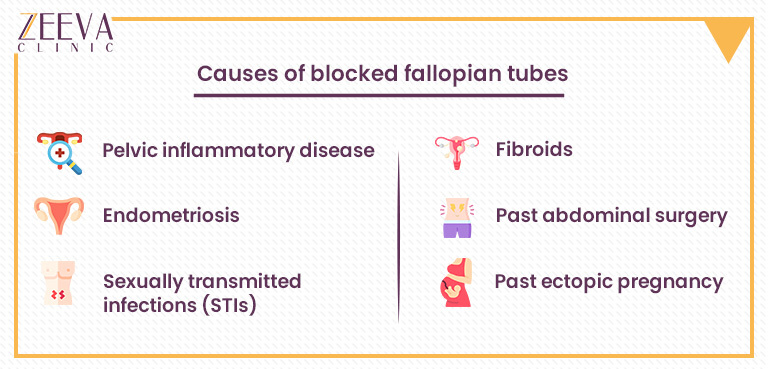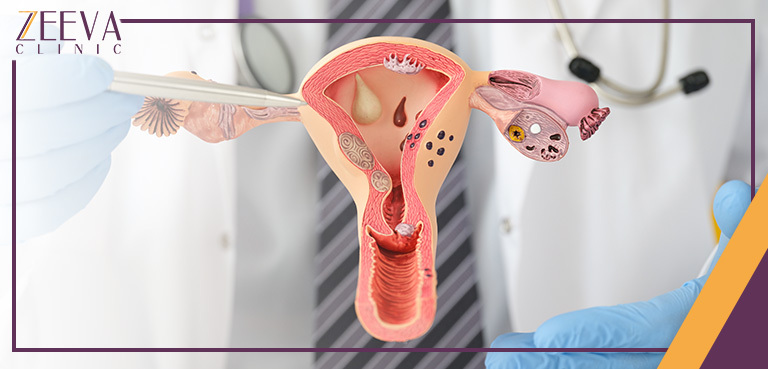A fallopian tube blockage can impact fertility. If we talk the fallopian tube meaning, these are two thin tubes, one on each side of the uterus, which help lead the mature egg from the ovaries to the uterus. A blockage, referred to as tubal factor infertility, is when an obstruction, for example, scarring, an adhesion, or infection, prevents the egg from traveling down the tube. This can be happened on one or both sides and is majorly the cause of infertility in up to one-third of infertile people with ovaries.
It’s unusual for people with blocked fallopian tubes to experience any symptoms. Many people with this condition assume their fertility is fine because they have regular periods. However, this isn’t always true.
When ovulation occurs each month, an egg is released from one of the ovaries. The egg travels through the tubes from the ovary to the uterus. Also, the sperm must swim right from the cervix, through the uterus, and then through the fallopian tubes to get to the egg. Usually, fertilization takes place while the egg is traveling through the tube.
If one or both are fallopian tube blockages, the egg can’t reach the uterus, and the sperm can’t reach the egg, eventually preventing fertilization and pregnancy. It’s also possible for the tube to not be blocked completely but only partially. This can lead to an increment in the risk of tubal pregnancy or ectopic pregnancy.
Also read – Tips for getting pregnant with one fallopian tube.
Table of Contents
ToggleFallopian Tube Blockage Symptoms

Unlike anovulation, where the irregular menstrual cycles might hint at a problem, blocked fallopian tubes rarely cause symptoms. Often, the first “symptom” of such tubes is infertility. In case you don’t get pregnant after one year of trying (or even after six months if you’re age 35 or older than that), your doctor will recommend a specialized X-ray to check your fallopian tubes, along with another basic fallopian tube test.
A specific kind of blocked fallopian tube, called hydrosalpinx, may cause lower abdominal pain and unusual vaginal discharge; however, not every woman will have these tube blockage symptoms. Hydrosalpinx occurs when a blockage causes the tube to dilate (increase in diameter) and fill with fluid. The fluid blocks the egg and sperm, which prevents fertilization and pregnancy.
However, some of the causes of fallopian tube blockages can have their symptoms. For example, pelvic inflammatory disease (PID) and endometriosis may cause painful menstruation & painful sexual intercourse.
Symptoms that could indicate pelvic infection include
- General pelvic pain
- Pain during sexual intercourse
- Foul-smelling vaginal discharge
- In acute cases – a fever over 101
- In acute cases – nausea, vomiting
- In acute cases, severe lower abdominal/pelvic pain
Acute pelvic infections can be extremely life-threatening. If you have severe pain or high fever, contact your doctor immediately or go to the nearest emergency room.
Effect on fertility
Fallopian tube blockages are frequently a common cause of infertility. For fertilization, sperm and an egg meet in the fallopian tube. A blocked tube can lead them to prevent from joining. Pregnancy without proper treatment will be impossible if both tubes are fully blocked. You can potentially get pregnant if the fallopian tubes are partially blocked. However, the risk of an ectopic pregnancy will increase.
This is because it’s difficult for a fertilized egg to shift through a blockage right to the uterus. In such cases, your doctor might recommend in vitro fertilization (IVF), depending on whether treatment for fallopian tube blockages is possible. If only one fallopian tube is blocked, the blockage won’t affect fertility, most likely as the egg can still travel through the unaffected fallopian tube. Additionally, fertility drugs can help increase your chance of ovulating on the open side.
To get the best medical attention and care, schedule an appointment with the best fertility specialist in Noida at Zeeva – leading fertility and IVF center in Noida.
Causes of blocked fallopian tubes

HSG Blocked Fallopian Tube is usually blocked by pelvic adhesions or scar tissue. These can be caused by many factors, which include:
- The pelvic inflammatory disease:-This disease can cause scarring or hydrosalpinx.
- Endometriosis:- Endometrial tissue can build up in the fallopian tubes and cause a blockage. This tissue outside of other organs can also lead to adhesions that block the fallopian tubes.
- Sexually transmitted infections (STIs):- Chlamydia and gonorrhea can lead to scarring and pelvic inflammatory disease.
- Past ectopic pregnancy:-This can scar the fallopian tubes.
- Fibroids:-These growths can block the fallopian tube, particularly where they attach to the uterus.
- Past abdominal surgery:- Past surgery, especially on the fallopian tubes, can cause pelvic adhesions that block the tubes.
Generally, you can’t prevent many causes of blockages. However, you can lower the risk of STIs by using a condom during intercourse.
Diagnosing fallopian tube blockages

Usually, blocked tubes are diagnosed with a specialized x-ray called a hysterosalpingogram or HSG. A hysterosalpingogram is one of the basic fallopian tube blockage tests ordered for every couple struggling to conceive. The fallopian tube test involves placing a dye through the cervix using a tiny tube. X-rays of the pelvic area are taken once the dye is in place.
The dye will go through the fallopian tubes and uterus and spill out around the ovaries and into the pelvic cavity if all is normal. If the dye doesn’t get through the tubes, you may have blockages.
It’s imperative to know that almost 15% of women have a “false positive,” in which the dye doesn’t get beyond the uterus and into the tube. Then, the blockage is right where the fallopian tube and uterus intersect. In such a case, the doctor may repeat the test another time or recommend a different test to confirm.
Another fallopian tube test may be ordered, including exploratory laparoscopic surgery, ultrasound, or hysteroscopy (a test in which a thin camera is placed through the cervix part to look at the uterus). Additionally, blood work to check for chlamydia antibodies (which would demonstrate the previous or current infection) may also be ordered.
Prevention
Pelvic infections cause the majority of fallopian tube blockages. Most but not all of these infections are caused by a sexually transmitted infection. An important step in preventing tubal infertility is regular screening for STIs; getting worrisome symptoms checked out right away will help. If the STI or pelvic infection is caught early enough, treating it may help prevent scar tissue development.
However, quiet doesn’t mean being harmless. The meaning is the longer the infection is present, the higher the risk of scar tissue forming or creating inflamed or blocked tubes. However, most infections are not much acute and often don’t result in any signs or symptoms.
Soon after an infection has been detected, an instant antibiotic treatment is important. However, treating the infection doesn’t guarantee the tubes will be clear. Antibiotics can only kill bacteria. So, any scar tissue or damage that has formed will not be completely treated by antibiotic treatment. This way, treating the disease can help prevent further damage and may make fertility fallopian tube blockage treatment or later surgical repair more likely to succeed.
Treatment for blocked fallopian tubes
If your fallopian tubes are blocked by adhesions or small amounts of scar tissue, your doctor can use laparoscopic surgery to remove the blockage and to open up the tubes. If your fallopian tubes are blocked by adhesions or large amounts of scar tissue, treatment for removing the blockages may not be possible.
Surgery may be an option to repair tubes that are damaged by infection or ectopic pregnancy. Additionally, if a blockage is caused due to a part of the tube is damaged, a surgeon can then remove the damaged section and connect the two fine and healthy sections.
The possibility of pregnancy
It’s possible to get pregnant by following treatment for fallopian tube blockages. Your chances of pregnancy will depend on the treatment method and the severity of the blockage. A pregnancy successful in nature is more likely when the blockage is around the uterus. If the blockage is at the end of the fallopian tube near the ovary, then success rates are lower.
The chance of getting pregnant after the conduction of surgery for tubes damaged by an infection or ectopic pregnancy is very small. It depends on what part is removed and how much of the tube will be removed. Talk to your doctor before fallopian tube blockage treatment to understand your chances of getting successfully pregnant.
To get the best medical attention and care, schedule an appointment with the best fertility specialist in Noida at Zeeva – leading fertility and IVF center in Noida .
Complications of blocked fallopian tubes
The most common complication of treatment for blocked tubes is ectopic pregnancy. An egg may be fertilized if a fallopian tube is partially blocked. However, it may get stuck in the tube. This leads to an ectopic pregnancy, which is called a medical emergency.
Surgery that eliminates the section of the fallopian tube also increases the chances of ectopic pregnancy. Due to these risks, doctors often recommend IVF instead of surgery for women with fallopian tube blockages who are otherwise healthy.
Way forward
Getting pregnant with low-tech treatments or on your own may be possible when just one fallopian tube is blocked. However, surgery or IVF treatment may be necessary when there are many fallopian tube blockages. You should talk to your doctor about all your options. If IVF or surgery is not possible for you, you can consider fostering care, adoption, or even choosing to live a child-free life. Ensure you have emotional support as you navigate this situation.
To get the best medical attention and care choose from the best IVF center in Noida.
FAQs
1. What are the signs & symptoms of blocked fallopian tubes?
In most cases, blocked tubes don’t create any symptoms. However, depending on the cause of the tubal blockage, they may reflect mild or extreme pain in the abdominal region and heavy periods.
2. Can blocked fallopian tubes be unblocked naturally?
No evidence that blocked tubes can be unblocked naturally.
3. What process do you use for fallopian tube blockage treatment?
Answer: Blocked Fallopian tubes can be temporarily fixed with tubal cannulation and surgeries.
4. Can a woman with blockages in fallopian tubes have periods?
Answer: Yes, a woman with blocked fallopian tubes has periods since the state of the fallopian tubes has nothing to do with menstruation.
5. Can blocking Fallopian Tubes cause miscarriage?
Answer: No. Previous miscarriages may lead to blockage in fallopian tubes.



